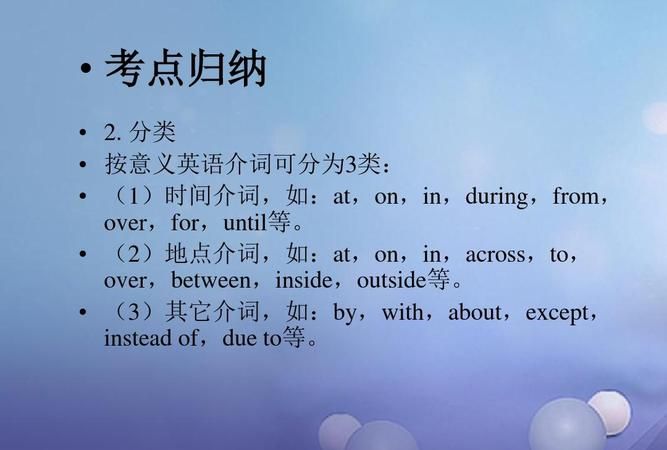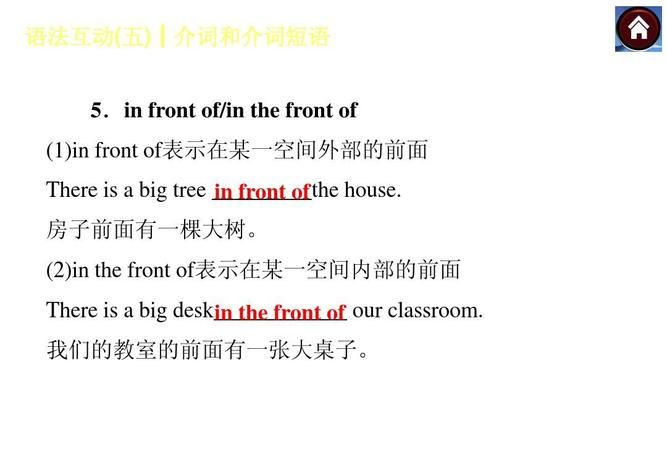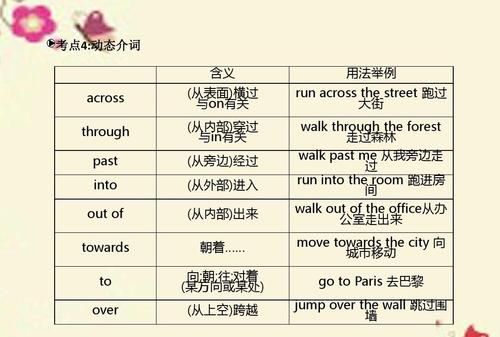本文目录
哪些词或短语后加doing
一、动词+介词to+动名词 1. admit to doing sth 承认做了某事 2. apply to doing sth 适用于做某事3. object to doing sth 反对做某事4. see to doing sth 负责做某事 5. stick to doing sth 坚持做某事6. take to doing sth 喜欢上做某事,逐渐习惯做某事应用实例:He admitted having stolen the money. 他承认偷了钱。These methods apply to learning English. 这些方法适用于英语学习。He objected to being treated like a child. 他反对被当作小孩子看待。Reporters should stick to investigating the facts. 记者应坚持调查事实。Soon he took to sleeping late. 不久他就养成了睡懒觉的习惯。
二、动词+宾语+介词to+动名词专心致力于做某事把……献给做某事9. devote oneself to doing sth 献身于做某事10. limit sth to doing sth 把…限制在做某事的范围内 11. reduce sb to doing sth 使某人沦为做某事12. give one’s life to doing sth 献身于做某事13. give one’s mind to doing sth 专心做某事14. have a dislike to doing sth 厌恶做某事15. have an eye to doing sth 注意做某事15. have an eye to doing sth 16. have an objection to doing sth 反对(反感)做某事17. pay attention to doing sth 注意做某事 18. set one’s mind to doing sth 决心做某事应用实例:She applied herself to learning English. 她专心学习英语。Hunger reduced them to stealing. 饥饿使他们沦落为盗贼。She devoted herself to helping the poor. 她致力于帮助穷人。I have a strong dislike to playing cards for money. 我极讨厌打牌赌博。He has a strong objection to getting up so early.他很反感这么早就起床。
三、be+形容词(含过去分词)+介词to+动名词19. be equal to doing sth 等于做某事,能胜任做某事 20. be used to doing sth 习惯于做某事so-bidi-font-size: 12.0pt; mso-hansi-f 21. be opposed to doing sth 反对做某事22. be reduced to doing sth使某人沦为做某事23. be devoted to doing sth 把时间(钱,精力等)献给做某事24. be limited to doing sth把……限制在做某事的范围内应用实例:This is equal to saying that he’s a cheat. 这就等于说他是个骗子。She is used to living in the country. 她习惯于住在乡下。I’m opposed to telling him the news at once. 我反对马上告诉他这消息。This dictionary is devoted to explaining word usage. 这本词典是解释词的用法的。四、其他结构+介词to+动名词 25. get down to doing sth开始做某事,认真处理某事26. look forward to doing sth 盼望做某事27. What do you say to doing sth? 你认为做某事如何?应用实例:We are looking forward to receiving his letter. 我们盼望收到他的回信。It’s time we got down to some serious work. 我们该认真干点正事了。

to作介词后跟doing的短语初中
to作为介词加doing的短语
Look forward to doing 盼望
Pay attention to doing something.留意

初中英语to do和doing短语总结
初中英语短语归类:
一、Doing类短语
1. allow doing sth允许做某事
2. by doing sth 通过做某事
3. be always doing sth总是做某事
4. be terrified of doing sth害怕做某事
5. be afraid of doing sth害怕做某事
6. be busy doing sth 忙于做某事
7. be against doing sth反对做某事
8. be good at doing sth 擅长做某事
9. be used for doin sth ……被用来做某事
10. be used to doing sth 习惯于做某事
11. be careful of doing sth 小心做某事
12. can’t \ couldn’t stop doing sth情不自禁做某事
13. continue doing sth 继续做某事
14. dream of \ about doing sth向往做某事
15. end up doing sth结束做某事
16. enioy doing sth享受做某事的乐趣、喜欢做某事finish doing sth 完成做某事
17. feek like doing sth 想做某事
18. give up doing sth 放弃做某事
19. go on dong sth 继续做某事
20. have difficulty\ trouble\ problem (in) doing sth做某事遇到困难麻烦问题
21. how about doing sth = what about doing sth 做某事怎么样呢?
22. have great fun doing sth做某事快乐
23. instead of doing sth 代替做某事
24. join sb in doing sth加入某人做某事
25. keep sb doing sth 让某人一直做某事
26. look forward to doing sth期待做某事
27. make a living by doing sth 通过做某事维生
28. mind doing sth介意做某事
29. need doing sth ……需要被做某事
30. practice doing sth 操练做某事
31. put off doing sth 推迟做某事
32. prefer doing sth to doing sth和做……相比更喜欢做某事
33. plan on doing sth计划做某事
34. plan for doing sth做某事的计划
35. sb spend some money in doing sth 某人做某事花了……钱
36. suggest sb doing sth建议某人做某事
37. stop sb from doing sth阻止某人做某事
38. thanks for doing sth = thank you for doing sth 感谢做某事
39. think about /of doing sth 思考做某事
二、to do类短语
1. allow sb to do sth允许做某事
2. ask for sth 请求某物
ask sb (not) to do sth 请求某人(不)做某事
3. afford to do sth 有能力做某事
4. agree to do sth 同意做某事
5. be afraid of doing sth 害怕做某事 be afraid to do sth害怕做某事
6. be sure (not) to do sth一定\ 务必 (不) 做某事
7. be suitable for sb to do sth 适合某人做某事
8. be ready to do sth乐意做某事
9. be hard to do sth 做某事艰难
10. be uesd to do sth
be used for doing sth ……被用来做某事
11. be willing to do sth乐意做某事
12. be able to do sth能够做某事
13. be serious about doing sth 认真对待做某事
14. be +形容词+ to do sth 做某事怎么样
15. be +形容词+ enough + to do sth足够的……而可以做某事
16. be supposed to do sth 被期待做某事、应该做某事
17. begin to do sth \ begin doing sth开始做某事
18. can’t \ couldn’t wait to do sth迫不及待做某事
19. decide (not) to do sth决定(不)做某事
20. encourage sb to do sth 鼓励某人做某事
21. forget to do sth忘记做某事(事未做)
forget doing sth 忘记做了某事(事情已经做了)
22. fail to do sth 做某事失败
23. go on to do sth 继续做某事
24. happen to do sth碰巧做某事
25. have a change to do sth = have an opportunity to do sth有机会做某事
26. help sb to do sth 帮助某人做某事
27. have (no) time to do sth(没有)有时间做某事
28. How long does it take sb to do sth? 花费某人多少时间做某事
29. in order to do sth 为了做某事
30. invite sb to do sth邀请某人做某事
31. It’s a good time to do sth做某事的好时候
32. It’s one’s duty to do sth做某事是某人的职责
33. It’s +形容词+ for\ of sb to do sth 做某事对某人来说怎么样(注意for\ of用法
34. It’s time (for sb) to do sth = It’s time for sth该(某人)做某事了。
35. It’s one’s turn to do sth 轮到某人做某事了
36. It takes sb some time to do sth花费某人…时间做某事(注意take的时态, sb用宾格)
37. like to do sth \ like doing sth喜欢做某事
38. learn to do sth 学习做某事
39. need to do sth 需要做某事、
40. plan to do sth计划做某事 41.
prefer to do rather than do sth 和做某事相比更喜欢做某事
42. remember to do sth 记住做某事 remember doing sth、记住做了某事
43. start to do sth \ start doing sth开始做某事
44. stop to do sth 停下来做(另一件)某事
45. stop doing sth停止做某事 46. try to do sth 努力做某事
47. try doing sth 企图做某事
48. tell sb . sth \告诉某人某事
tell sb about sth 告诉某人关于某事
tell sb (not) to do sth告诉某人 (不) 做某事
49. the best way to do sth做某事的最好途径
50. teach sb .sth 教某人某事 teach sb to do sth教某人做某事
51. try one’s best to do sth 尽力做某事
三、不带to的动词短语
1. had better (not) do sth最好(不)做某事
2. Would you please (not) do sth请你(不)做某事,好吗?
3. let \ have \ get sb do sth让某人做某事 被动语态:sb be permitted to do sth
某人被允许做某事=sb be allowed to do sth
4. make sb do sth迫使某人做某事 被动语态:sb be made to do sth
5. watch sb do sth看见某人做了某事 被动语态sb be watched to do sth
watch sb doing sth注视某人正在做某事
6. see sb do sth看见某人做了某事 被动语态sb be seen to do sth
see sb doing sth看见某人正在做某事
7. find sb do sth发现某人做了某事 被动语态sb be found to do sth
find sb doing sth发现某人正在做某事
8. feel sb do sth感觉某人做了某事 被动语态sb be felt to do sth
feel sb doing sth感觉到某人正在做某事
9. notice sb do sth感觉某人做了某事 被动语态sb be noticed to do sth
notice sb doing sth注意到某人正在做某事

介词后面加ing形式吗
一般来说是在介词后面直接跟动词ing形式。
介词后面的动词固定都要加上ing的形式,但是to这个介词例外。有时候也用to do sth的形式,也就是不定式的形式。如果to当介词用就和一般的介词没两样,后面也是只要有动词就用ing的形式。但是是不定式的话就只能用to do的形式了。

扩展资料:
前置词和它的宾语构成介词词组,在句中作状语,表语,补语,定语或介词宾语。同时介词的用法也很灵活,同一个介词可以表达多种意义,介词可以分为时间介词、地点介词、方式介词、原因介词、数量介词和其他介词。
前置词一般用于名词或者代词前面,表示该词与句中其他成分的关系。前置词后面的名词或代词称为前置词的宾语(如果是人称代词,则要用宾格)。前置和宾语合在一起构成前置词短语。
参考资料来源:百度百科-介词
以上就是关于介词doing短语 ,哪些词或短语后加doing的全部内容,以及介词doing短语 的相关内容,希望能够帮到您。
